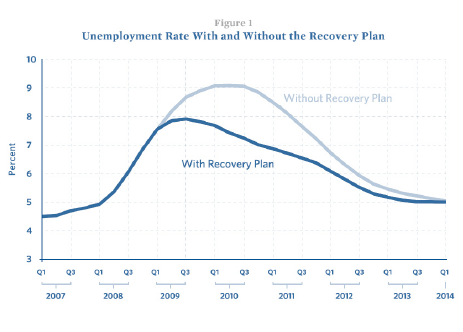So, according to the vast majority of respected economists, including those with Nobel prizes, the stimulus might work, but it might be too late for anything to make things better in the short term. Even Christina Romer (President Obama’s economic adviser) thinks the stimulus will only slow the growth rate of the unemployment rate in the near term, bringing it back down in two years. But, they all agree that to do nothing is definitely not going to do anything of value.

“We have very few good examples to guide us,†said William G. Gale, a senior fellow at the Brookings Institution, the liberal-leaning research organization. “I don’t know of any convincing evidence that what has been proposed is going to be enough.â€
Christina Romer, whom Mr. Obama has designated to be his chief economist, concluded in research she helped write in 1994 that interest-rate policy is the most powerful force in economic recoveries and that fiscal stimulus generally acts too slowly to be of much help in pulling the economy out of recessions, though associates said she now supports a big stimulus package if policy makers roll it out early enough in the recession.
Adam Posen, the deputy director of the Peterson Institute for International Economics in Washington, said Mr. Obama’s plan could provide just the right boost — if it was carried out properly.
Alan J. Auerbach, an economist at the University of California, Berkeley, said the overall scale of the program looked “reasonable†at $800 billion over two years.
“It’s much bigger than anything that’s been tried in my lifetime, but this is scarier than anything we’ve seen in my lifetime,†Professor Auerbach said.
For those who point out that Romer once said that throwing money at a recession doesn’t work – no. You’re wrong, that’s not what she said. She said that monetary policy is better to use than fiscal policy. Unfortunately, the interest rates are at zero now, so there is no more room for monetary policy. Fiscal policy is what we have available, so that’s what we’re stuck with.
For those who think that tax cuts or tax rebates are better than paying for infrastructure buildouts – no. You’re wrong, and almost no economist agrees with you.
Mark M. Zandi, chief economist at Moody’s Economy.com, a forecasting firm, told a forum of House Democrats this week that the “bang for the buck†— the additional economic activity generated by each dollar of fiscal stimulus — was highest for increases in food and unemployment benefits. Each dollar of additional money for food stamps yields $1.73 in additional economic activity, Mr. Zandi estimated, and each extra dollar in unemployment benefits yields about $1.63.
By contrast, Mr. Zandi estimated, most tax cuts produce less than a dollar for each dollar of stimulus, especially if the tax cuts are temporary, because people save at least some of their extra money.
Joel Slemrod, a professor of tax policy at the University of Michigan, said, “The research I’ve done on the 2001 and 2008 tax rebates suggests that the proportion of the rebates that went to spending was rather small, about one-third.â€
I look forward to more random people throwing up logical fallacies. How about, “argument from personal incredulity?” That’s always a good one. After all, if something doesn’t make sense to you, I’m sure that highly trained economists have spent no time at all on it and it’s all just a guess to them too. Over 140 economists, including 5 Nobel Prize winners, support the stimulus package. If you want to convince me of your point of view, bring more expert opinion than that.

 Previous
Previous  Next
Next 



 Categories
Categories Tag Cloud
Tag Cloud Blog RSS
Blog RSS Comments RSS
Comments RSS
 Last 50 Posts
Last 50 Posts Back
Back Void
Void  Life
Life  Earth
Earth  Wind
Wind  Water
Water  Fire
Fire
Think for yourself…
The CBO analysis of the stimulus is available online. If you really want to know what the impact of the stimulus may be, read it for yourself. Don’t believe whatever talking heads say. Especially don’t believe what they said last week, befo…
[…] year after I posted the “with and without stimulus” economist projection, it’s interesting to see how things have actually panned […]
[…] in January 2009, right after the inauguration, I posted a quick summary of views from economists about the expected effect of the stimulus. The stimulus was expected to […]